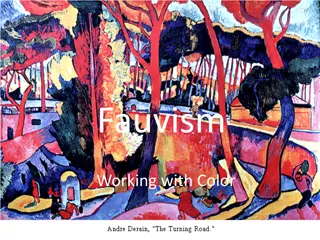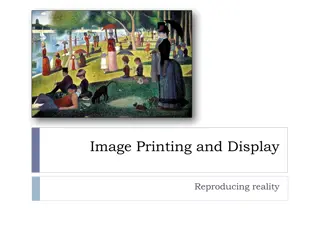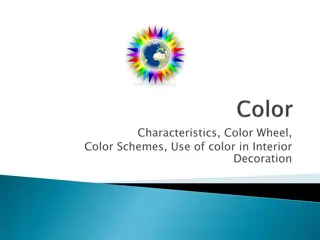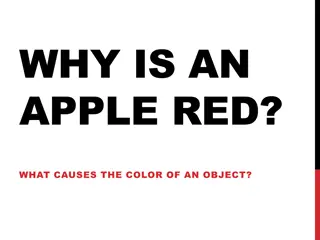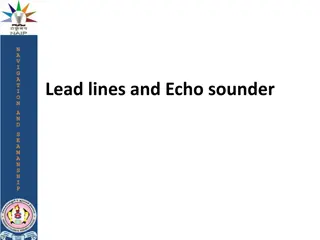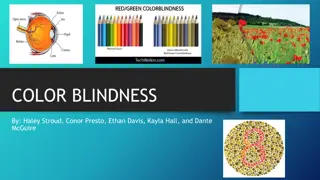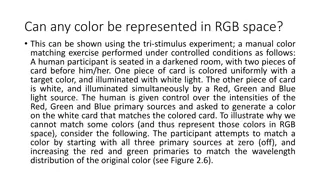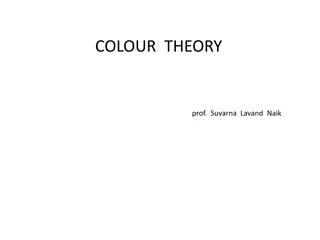Understanding Color Theory: A Comprehensive Guide to Colors
Explore the fascinating world of colors with an in-depth look into color theory. Learn about chromatic and achromatic colors, neutral colors, hues, color wheels, primary and secondary colors, tertiary colors, values, tints, shades, and tones. Delve into the visual responses of the eye to reflected r
2 views • 19 slides
Electrical Engineering Depth Charts 2021-2022
This catalog showcases various depth charts in the field of Electrical Engineering for the academic year 2021-2022. The depth charts cover a range of topics including electric energy, electromagnetic fields, solid-state devices, bio-electrical systems, electronic circuits, and communication systems.
0 views • 11 slides
Color Accessibility Guidelines and Examples
Enhance color accessibility in presentations by following Louisiana Tech University's guidelines for using brand colors, text sizes, and color combinations. Learn how to create visually inclusive content and promote readability for all audiences. Explore approved color palettes and typography recomm
2 views • 11 slides
Fun Art Task: Creating a Color Wheel
Explore color relationships by mixing secondary and tertiary colors to create a vibrant color wheel. Learn about primary, secondary, and tertiary colors, and follow step-by-step instructions to create your own color wheel using basic art supplies. Enhance your understanding of color theory through t
1 views • 12 slides
Enhancing Geotechnical Investigation Methods in Ghana for Foundation Design of Large Structures
Enhancing the standard of geotechnical investigation field testing in Ghana is crucial to ensure appropriate use of equipment like DCP for designing foundations of large structures. Objectives include assessing site suitability, obtaining design inputs, anticipating construction challenges, and esti
0 views • 31 slides
Understanding Temperature and Color Relationship in Candle Flames
Explore the relationship between temperature and color in candle flames through the three zones model. By conducting experiments using a thermocouple sensor, investigate how the color gradient in a flame correlates with its temperature variations. Learn about the structure of a candle flame, the inf
1 views • 21 slides
Limit Test of Iron Based on Color Reaction with Thioglycollic Acid
The limit test for iron involves the reaction of iron in ammoniacal solution with citric acid and thioglycollic acid to form a reddish-purple color. By comparing the color produced with a standard solution, the presence of iron is determined. Citric acid prevents precipitation of iron, while thiogly
1 views • 5 slides
Mastering Color in Film: A Comprehensive Guide to Using Color Grading Techniques
Explore the intricate world of color in filmmaking through understanding color grading, log explained, Log rec.709, color correction, and grading techniques without LUTs. Enhance your storytelling by harnessing the power of color to evoke emotions and create visual impact in your films.
1 views • 6 slides
Understanding Color Theory: A Visual Guide for Effective Communication
Explore the fundamentals of color theory, from primary to tertiary colors, and how they can be combined to achieve aesthetic blends, readability, and convey meaning. Discover the role of the color wheel in making purposeful color selections for creating visual impact and contrast in design and commu
0 views • 21 slides
Comparison of SedLine and BIS Depth of Sedation Performance in General Anesthesia
This study evaluates the performance of SedLine and BIS monitoring devices in measuring anesthetic depth during general anesthesia. The research protocol aims to compare processed EEG indices from both monitors across various levels of anesthetic depth using a custom interface box. Inclusion criteri
0 views • 10 slides
Understanding Fauvism: Working with Colors and Color Schemes
Fauvism is an art movement known for its bold and arbitrary use of colors. Fauvist painters carefully selected colors to convey specific moods in their artworks. This guide explores Fauvism, color theory, and different color schemes to help you create your own expressive painting. Learn about comple
0 views • 8 slides
Evaluation of Ocean Color Inversion Models for Retrieving Marine IOPs
Evaluating and generalizing ocean color inversion models to retrieve marine inherent optical properties (IOPs) is essential for understanding ocean dynamics. This involves choosing the right algorithm and validating its effectiveness, as discussed in the Ocean Optics Summer Course at the University
0 views • 23 slides
Understanding Color Theory: A Comprehensive Guide
Practical guidance on color theory including the color wheel, color schemes, and color psychology. Learn about the importance of utilizing various color schemes like monochromatic, complementary, and analogous to create effective designs. Understand how different colors convey meanings and emotions
0 views • 11 slides
Understanding Image Display and Halftoning Techniques
Images are reproduced for display on various devices like televisions, computer monitors, and newspapers with specific characteristics such as pixel shape, spatial resolution, and color depth. Issues with display devices, such as pixel resolution and color depth, affect fidelity. Halftoning methods,
3 views • 44 slides
Understanding Color: Characteristics, Color Wheel, and Interior Decoration
Color is a vital aspect of our everyday lives, evoking various emotions and perceptions. This article delves into the characteristics of color, the color wheel, color schemes, and the use of color in interior decoration. It explains how colors are perceived, the qualities of color like hue, value, a
1 views • 51 slides
Solving Problems by Searching in Artificial Intelligence: Uninformed Search Strategies
In the field of Artificial Intelligence, solving problems through searching is essential. Uninformed search strategies, also known as blind search, involve exploring the search space without any additional information beyond what is provided in the problem definition. Techniques such as Breadth-Firs
1 views • 26 slides
Fun and Educational Color Mixing Experiment for Elementary Students
Engage elementary school students in a hands-on color mixing experiment using primary colors to create secondary colors. The activity involves visual demonstrations, color paddles, and mixing colored goo in bags to understand color blending and create unique color combinations. Through this interact
0 views • 7 slides
Color Decorating Tips: The 60-30-10 Rule for a Balanced Room Palette
Utilize the 60-30-10 rule when selecting colors for a room: 60% for walls, 30% for furniture, and 10% for accents. The dominant color should complement the room's style, with the secondary color harmonizing with it. The accent color adds a bold touch through decorations. Consider existing furniture
0 views • 7 slides
Understanding the Science of Color Perception
Objects appear colored due to selective reflection of light wavelengths - some are absorbed, and the rest are reflected. The eye's complex structure, including the cornea, iris, pupil, lens, and retina, plays a crucial role in perceiving color. Color blindness results from missing cone cells in the
0 views • 9 slides
Understanding Balance and Color in Design
Explore different types of balance in design, such as symmetrical, asymmetrical, and radial, and learn about color theory concepts like color schemes, color wheels, and contrast. Discover how colors interact, create focal points, and influence the overall composition in visual design.
0 views • 33 slides
Understanding Lead Lines and Echo Sounders for Depth Measurement
Dive into the world of lead lines and echo sounders for depth measurement. Discover the ancient navigational instrument, the construction of lead lines, and the markings used for different depths. Learn about the traditional use of lead lines by fishermen and the importance of these tools in shallow
0 views • 23 slides
Understanding Attributes and Color Schemes in Graphics
Graphics systems utilize attributes to define how primitives are displayed, such as color and size, while color and grayscale can be stored in different ways like direct storage and indexed storage schemes. The RGB color components play a key role in determining the color shades, with various color
0 views • 51 slides
Analysis of Diving Behavior in Christmas Shearwaters
This study aims to quantify the diving patterns of Christmas Shearwaters (CHSH) using time-depth-recorder (TDR) raw data. The analysis focuses on exploring correlations between dive profiles and time blocks standardized across three months. Data processing involved outlier removal, sample size adjus
0 views • 12 slides
Lower Bounds for Small Depth Arithmetic Circuits
This work explores lower bounds for small-depth arithmetic circuits, jointly conducted by researchers from MSRI, IITB, and experts in the field. They investigate the complexity of multivariate polynomials in arithmetic circuits, discussing circuit depth, size, and the quest for an explicit family of
0 views • 114 slides
Understanding Color Vision in Primates and Mammals
Explore the fascinating world of color vision in primates and other mammals through trichromatic and dichromatic color vision systems. Discover how dichromats and trichromats perceive colors differently due to the types of color-detecting cells in their retinas. Learn why most mammals are dichromats
0 views • 24 slides
Understanding Color: A Comprehensive Overview
Color is a fascinating aspect of our visual world, explored through the prism of science and light. This chapter delves into the origins of color perception, from Isaac Newton's study of the color spectrum to the reflection and transmission of light that determines how we see colors. Gain insights i
0 views • 28 slides
Understanding Color Blindness: Causes, Symptoms, and Types
Color blindness, also known as color vision deficiency, is a genetic disorder that affects the ability to distinguish between certain colors. It is caused by the absence of color-sensitive pigment in cone cells of the retina, often passed down on the X chromosome. Symptoms vary from difficulty diffe
1 views • 16 slides
The Impact of Colors on Decision Making in Visual Displays
Investigating the influence of color on decision-making, particularly in legal contexts, through the manipulation of photographs with different color schemes. Prior research suggests that color can play a crucial role in how visuals are perceived and remembered, especially in litigation settings. By
0 views • 37 slides
Exploring the Basics of Color Theory
Understand the essence of color with insights into the sources, perception, and interpretation of color. Dive into the color wheel, primary, secondary, tertiary, warm, cool, and neutral colors, and learn about color harmony to create visually pleasing designs.
0 views • 14 slides
Understanding Color Representation: RGB vs. CIE vs. HSV Models
Exploring the limitations of representing all colors in RGB space and the alternative approaches offered by the CIE color space and HSV color model. While RGB is limited by additive primaries, CIE provides a broader range of color representation, and HSV simplifies color perception by emphasizing hu
0 views • 8 slides
Understanding Color Blindness: Types, History, and Impacts
Color blindness, also known as color vision deficiency, affects individuals by limiting their ability to perceive certain colors. It was first discovered by John Dalton, who suffered from red/green color blindness himself. The two main types are red/green and blue/yellow color blindness, each with i
0 views • 19 slides
Understanding Color Blindness: Causes, Symptoms, and Diagnosis
Color blindness, also known as color vision deficiency, is a genetic disorder that affects the ability to distinguish between colors. John Dalton discovered color blindness in 1794. It is inherited in an X-linked recessive pattern and can cause difficulties in daily life, such as trouble seeing colo
0 views • 13 slides
Understanding Experiences of Women of Color Faculty in STEM Academia
Women of color face unique challenges in STEM academia due to the intersectionality of gender and race, impacting their workplace perceptions. This paper explores the experiences of underrepresented women of color in academia, comparing them with their STEM colleagues in terms of stress sources, wor
0 views • 11 slides
Understanding Design Principles: Contrast, Repetition, Alignment, Proximity, Color Theory
Explore the significance of design principles such as contrast, repetition, alignment, proximity, and color theory in creating visually appealing and effective designs. Learn how contrast plays a vital role in guiding the viewer's attention and enhancing visual interest through various techniques li
0 views • 30 slides
Understanding Color Fundamentals in Graphic Design
Delve into the basics of color theory essential for graphic design. Learn how additive and subtractive colors work, the significance of CMYK in printing, and the various color modes in Photoshop. Gain insights into creating vibrant designs by mastering color management techniques.
0 views • 87 slides
Exploring the Impact of Color in Film Studies
Delve into the fascinating world of color in films through a series of engaging activities and discussions. From black and white classics to vibrant modern movies, uncover how color choices influence storytelling, evoke emotions, and captivate audiences. Explore the history, science, and psychology
0 views • 6 slides
Overview of Color Models in Computer Graphics
Color models in computer graphics play a crucial role in creating a wide range of colors using a limited set of primary colors. There are two main types of color models - additive and subtractive, with RGB being common for displays and CMYK for printing. RGB is additive, combining red, green, and bl
0 views • 16 slides
Is Clarifying Shampoo Suitable for Color-Treated Hair
Color-treated hair requires special care, as it is often more vulnerable to dryness, damage, and color fading. For many people, clarifying shampoo has become an essential part of their haircare routine, but is it safe for those with color-treated hai
0 views • 4 slides
Understanding Color Theory: Basics and Applications
Color theory encompasses the color wheel, color harmony, and how colors are used. It provides a logical structure for organizing and creating colors. Primary, secondary, and tertiary colors play key roles in this theory, along with concepts like color harmony and context. By understanding color theo
0 views • 28 slides
Factors Affecting Depth of Field for Scanning Electron Microscopy (SEM)
Understanding the factors that affect the depth of field in SEM is crucial for achieving sharp and detailed images. Factors such as the aperture size, working distance, magnification, and emission disc size play a significant role in determining the depth of field. By manipulating these factors, one
0 views • 11 slides










